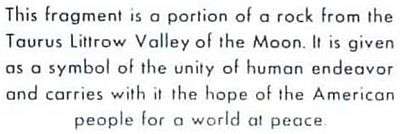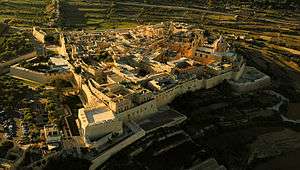Malta lunar sample displays
The Malta lunar sample displays are two commemorative plaques consisting of small fragments of Moon specimen brought back with the Apollo 11 and Apollo 17 lunar missions and were given to the people of Malta by United States President Richard Nixon as goodwill gifts.[1][2]
Description
Apollo 11
The Malta Apollo 11 lunar sample display commemorative podium style plaque consists of four "Moon rock" rice-size particle specimens that were collected by Apollo 11 astronauts Neil Armstrong and Buzz Aldrin in 1969 and a small Maltese flag that was taken to the Moon and back on Apollo 11.[1]
The four "Moon rocks" weigh about 0.05 grams in total. They are encased in a clear plastic ball the size of a coin which is mounted to a wooden board approximately one foot square on a small podium pedestal display. The small podium plaque display also has mounted on it a small Maltese flag that had been taken to the Moon and back on Apollo 11, which lay directly below the "goodwill Moon rocks". The small podium plaque display was given to the people of Malta as a gift by United States President Richard Nixon. Similar "Moon rocks" displays were also given to the other 134 worldwide countries.[1]
Apollo 17

The Malta Apollo 17 lunar sample display commemorative style plaque (10 by 14 inches) consists of one "Moon rock" particle specimen that was cut from lunar basalt 70017 and a Maltese flag. The basalt 70017 was collected by Apollo 17 astronaut Harrison Schmitt on the Moon in 1972. Once lunar basalt 70017 was brought back to Earth from the Moon, the basalt Moon rock was cut up into small fragments of approximately 1 gram. The specimen was encased in a plastic ball and mounted on the wooden plaque along with the Maltese flag which had been taken to the Moon and back by the crew of Apollo 17. The plaque was then distributed in 1973 by President Nixon to the country of Malta, as he did that year to the other 134 countries of the world (the same countries previously for the Apollo 11 plaque display gifts) and again to all 50 states of the United States. This was done as a goodwill gesture to promote peace and harmony.[2]
History

The Maltese Apollo 17 goodwill lunar sample display that was given to Malta was stolen in 2004. It had been housed in Mdina at the Museum of Natural History. The curator of the museum found it missing during a daily inspection. The single "Moon rock" within the clear plastic ball mounted on the top of the wooden lunar display weighted just over 1.1 gram.[3][4]
The Moon rock's unguarded display case was broken open and the clear plastic ball that enveloped the "Moon rock" was removed from the 10 inch by 14 inch wooden presentation display board. The Maltese flag that had flown on the Apollo 17 mission and was also mounted this presentation plaque was left behind untouched, suggesting an amateur thief. The wooden presentation display together with the Maltese flag would have proven where the Moon rock came from and established its value.[5]
Joseph Richard Gutheinz, a retired NASA agent who has made it his job to recover other missing "goodwill Moon rocks", told the Associated Press that the thief or thieves involved with taking the Maltese "goodwill Moon rock" will have trouble figuring out what to do with it. He said they could try to sell it to private collectors, if they could prove what it is and its value. He even surmised that they may be dumb enough to try to sell it at an auction house.[6]
Gutheinz suggested offering an amnesty period for the thieves to try to recover the stolen Moon rock. This offer was backed up and printed in the Times of Malta newspaper. As of 2012, the Apollo 17 Maltese "goodwill Moon rock" is still missing. Gutheinz suspects that counterfeit variations will be sold for decades. Heritage Malta condemned the thieves as being "cowardly" and asked help from anyone who may have information on the theft or the thieves.[6]
The Maltese Apollo 11 goodwill lunar sample display given to Malta is housed in the Gozo Museum of Natural Science in Gozo, Malta.[1]
References
- Pearlman, Robert (1999–2012). "Where today are the Apollo 11 goodwill lunar sample displays?". collectspace.com. Retrieved November 2, 2012.
- Pearlman, Robert (1999–2012). "Where today are the Apollo 17 goodwill lunar sample displays". collectspace.com. Retrieved November 2, 2012.
- "Moonstone fragment". The Gozo Museum of Natural Science Collection. Retrieved November 2, 2012.
- Pearlman, Robert (May 21, 2004). "Moon rock stolen from Maltese museum". collectspace.com. Retrieved November 2, 2012.
- Associated Press (May 21, 2004). "$5M moon rock stolen from Malta museum". Valletta, Malta: Gannett. Retrieved November 2, 2012.
- Gutheinz, Joseph Richard (November 2004). "The Maltese moon rock". In Search of the Goodwill Moon Rocks: A Personal Account. Geotimes. Retrieved November 2, 2012.
Further reading
- Kloc, Joe (February 19, 2012). The Case of the Missing Moon Rocks. The Atavist/Amazon Digital Services, Inc. p. 47. ASIN B007BGZNZ8.
